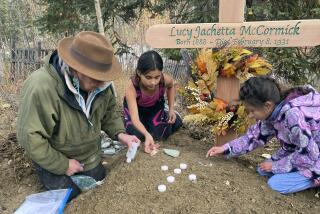Two Women Die as They Lived--Alone
- Share via
DECATUR, Ala. — For days, there had been no sound from behind the drawn curtains of the mustard-colored house, none of the usual yelling between the reclusive mother and daughter who lived there.
Neighbors had wondered if everything was OK. But knowing they’d be cursed at, they hadn’t knocked at the door.
Behind that door, all was still and cold and dark. Paintings of Jesus stared from the walls in a house filled with dozens of Barbie dolls, a mother’s gifts to daughter year after year, still wrapped in plastic.
Marilyn Arnold sat in an old kitchen chair in the living room. Beside her, on a dingy sofa, lay her 85-year-old mother, Evelyn, the only person she really knew. Evelyn had been dead for days.
Marilyn could have walked out on the stench of death. After 57 years, she didn’t have to obey anymore. There was no one to fight with. But she stayed, obedient to the end, as Mama would have wanted.
When police finally broke in, Marilyn was slumped over in a grotesque bow to her mother. Each wore a bright blue sweater and a dress.
“Unknown natural causes” was the coroner’s shorthand explanation for both deaths.
But relatives and acquaintances believe the cause of Marilyn’s death, at least, was known. And it wasn’t natural: It was a case of terminal isolation.
Decades ago Evelyn had cut her family off from relatives. Even neighbors of 20 years were afraid to step into the yard for fear of a profane tirade. Marilyn never went outside without Mama.
Few were ever invited into the small wood-frame home in this north-central Alabama city of about 53,000 on the Tennessee River. The house was jammed with thousands of magazines and books, many wrapped in plastic, all neatly stacked.
Evelyn told neighbors and relatives that Marilyn was retarded, but the family now wonders how true that was. “Evelyn just didn’t let her grow up,” said Sharon Arnold, a sister-in-law.
No one is sure why they used big white buckets for toilets. Plumbing in the house worked fine. Evelyn once said Marilyn was afraid of the bathroom. Neither liked the bathtub.
“They didn’t use the tub because the people who lived there before them might have had germs,” Sharon Arnold said.
Evelyn noted every purchase in spiral notebooks, and she kept a log of every wrong number that came to their telephone dating back at least six years. The last entry: “11-12-97 5 minutes after 5.”
There was no television, only an old radio. The heavy curtains were always drawn. The room was so dark that police needed flashlights in midafternoon. The women had used battery-powered camping lamps for lighting.
They rarely left the house, but neighbors knew they had a fiery relationship. They often heard them screaming at each other.
“If I had just known, or if someone had just known. But we didn’t,” said Sharon Arnold. Her husband, Allen, was Marilyn’s half-brother, but they hadn’t seen each other in 50 years.
Another relative lived a few minutes away in Athens, but she hadn’t talked to the pair since Evelyn’s daughter from another marriage, Delores Jean Bourgeois, died in the same house seven years ago.
“I hadn’t seen them in years and years,” said Armenta Ennis, Evelyn’s cousin.
Their isolation began around 1945, when Evelyn took her two daughters and left her husband, Hubert “Speck” Arnold, who ran a beer joint in Senoia, Ga., about an hour south of Atlanta. He died years ago.
The three moved to Washington, where Evelyn told relatives she worked in a hospital. Around 1974 they moved to Decatur.
Neighbors knew immediately there was something odd about the three women. They never left the house alone, and Evelyn always wore the same print dress.
“We’d call them the three sisters,” said Sharon White, co-owner of a printing business near the house. “Then we found out it was a mother and two daughters.”
Delores Jean, who suffered from epilepsy and used a wheelchair, died at home in September 1991. “She talked with more sense than either of them,” said Vernon Seals, a next-door neighbor.
After her death, Evelyn and Marilyn withdrew further.
Umbrella in hand no matter what the weather, Evelyn spoke to Sharon White on her daily trip to the corner store to buy a newspaper. Marilyn nearly always stayed home, peeking through the curtains.
“[Evelyn] wasn’t friendly to most people,” Sharon White said.
Despite her age and her need for a cane, Evelyn did all the household chores. Neighbors complained when she dumped the buckets of human waste in the backyard.
“Marilyn wouldn’t answer the phone. Mrs. Arnold would be outside, and she’d come to the door saying, ‘Mama, the phone’s ringing,’ ” said Seals’ wife, Mary.
The Sealses found it odd in early November when the two took a taxi home from the store and Marilyn was carrying the groceries. Evelyn always did that. Later that month, there was something even stranger: Marilyn was outside alone, sweeping the porch. About that time, next-door neighbor Lottie Pruitt noticed the yelling had stopped.
“I had missed ‘em, but I didn’t say anything to anybody,” Pruitt recalled. She thought Evelyn must be sick, and Marilyn had no one to fuss with.
Finally, on Dec. 3, Seals called police. The Arnolds had missed their monthly ritual of taking a cab to pick up their Social Security and government disability checks from a post office box.
Police found the bodies. Authorities believe Evelyn died around Nov. 12, the last entry in her phone log. Marilyn apparently lived about a week longer.
“The kitchen was like a child had been in it,” said Sharon Arnold. “There was a pan that had something burned in it, and there were dirty dishes in the sink.”
There were no autopsies, because police found no signs of a crime.
The electricity had been shut off in mid-November for an overdue bill of about $20, leaving no source of heat. But Coroner Gene Shelton said the cold probably was not a factor in the deaths because the weather was mild and the women were dressed warmly. Four blankets were folded neatly at the end of the sofa.
Sharon Arnold’s husband, who had lost track of them two decades ago, hurried to Decatur. It was only then that relatives learned how alone the women were.
It’s just a hunch, but Sharon Arnold believes Marilyn suffered food poisoning after Evelyn’s death. Neighbors say she would never have sought aid or answered the door or phone if someone had tried to help.
Mama wouldn’t have allowed it.
“You could tell by the way [Evelyn] talked she ran things,” Sharon White said. “She ruled.”
Some have criticized neighbors for not checking on the two sooner. But Evelyn’s cousin, Armenta Ennis, said a knock on the door wouldn’t have helped.
“She probably wouldn’t have let them in if they had gone,” she said. “They really didn’t want anybody.”
More to Read
Sign up for Essential California
The most important California stories and recommendations in your inbox every morning.
You may occasionally receive promotional content from the Los Angeles Times.












